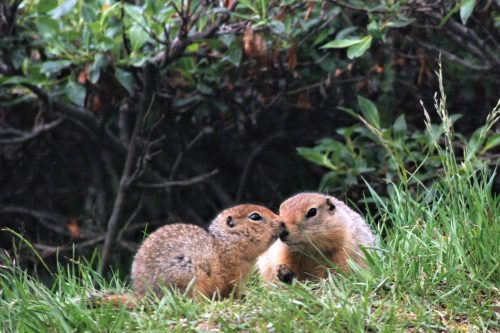Omega-3 fat helps keep hibernating ground squirrels warm
January 14, 2021
Jeff Richardson
907-474-6284

By feeding arctic ground squirrels special diets, researchers have found that omega-3 fatty acids, common in flax seed and fish oil, help keep the animals warmer in deep hibernation.
A University of Alaska Fairbanks-led study fed ground squirrels either a diet high in omega-3s or a normal laboratory diet, and measured how the animals hibernated afterward. Researchers found that the omega-3 diet helped the animals hibernate a little warmer than normal without negatively affecting hibernation. The omega-3 diets also increased the amount of a heat-producing fat, called brown adipose tissue, the animals pack on.
The discovery could add more understanding about how hibernation works and why animals eat some types of foods. The study was published Jan. 14 in the journal Scientific Reports.
“Arctic ground squirrels have an innate ability to withstand harsh subzero temperatures for an incredible amount of time,” says Monica Mikes, who at the time of the study was an undergraduate researcher at UAF and a scholar in the university’s Biomedical Learning and Student Training program.
Mikes, who also co-designed the study, noted that the animals are able to take their body temperature below freezing. How hibernators regulate body temperature has fascinated researchers for over a century. The type of fat they eat might have something to do with that.
Recent studies have found that omega-3s can affect metabolism in nonhibernating animals. Since wild hibernators are known to eat diets rich in omega-3 foods, the researchers wanted to know if those animals benefited from eating those diets.
“Fat is incredibly important in hibernation,” said lead author Sarah Rice, who was a Ph.D. student at UAF’s Institute of Arctic Biology at the time of the study. “Not only do these animals live off their fat stores, but the more people study specific types of fat, the more they realize specific types of fat can help regulate and signal the body to do certain things.”
Scientists know hibernators specifically seek out and store polyunsaturated fatty acids, known as PUFAs, prior to hibernation. While omega-6 PUFAs have been well-studied in hibernation and are known to reduce temperature, omega-3s have been less studied.
As arctic ground squirrels experience extreme cold in their natural dens, eating more omega-3s to help increase brown adipose tissue may help defend against extreme cold in the wild. Researchers in this study did not investigate which foods might provide ground squirrels in the wild with such omega-3s.
“People know eating omega-3s like fish oil is good for them. Apparently, squirrels may realize this too, and it may have specialized effects for hibernators,” Rice said.
Other contributors to the paper include Kelly Drew at the UAF Center for Transformative Research in Metabolism; Julie Reisz, Sarah Gehrke and Angelo D’Alessandro at the University of Colorado’s Department of Biochemistry and Molecular Genetics; Doug Bibus at Lipid Technologies; and Evgeny Berdyshev and Irina Bronova at National Jewish Health, a Denver-based hospital.
ADDITIONAL CONTACTS: Sarah Rice, sarice@alaska.edu; Monica Mikes, mmikes2@alaska.edu; Kelly Drew, kdrew@alaska.edu
NOTE TO EDITORS: The full Scientific Reports paper is available at http://bit.ly/SquirrelNutritionUAF.


